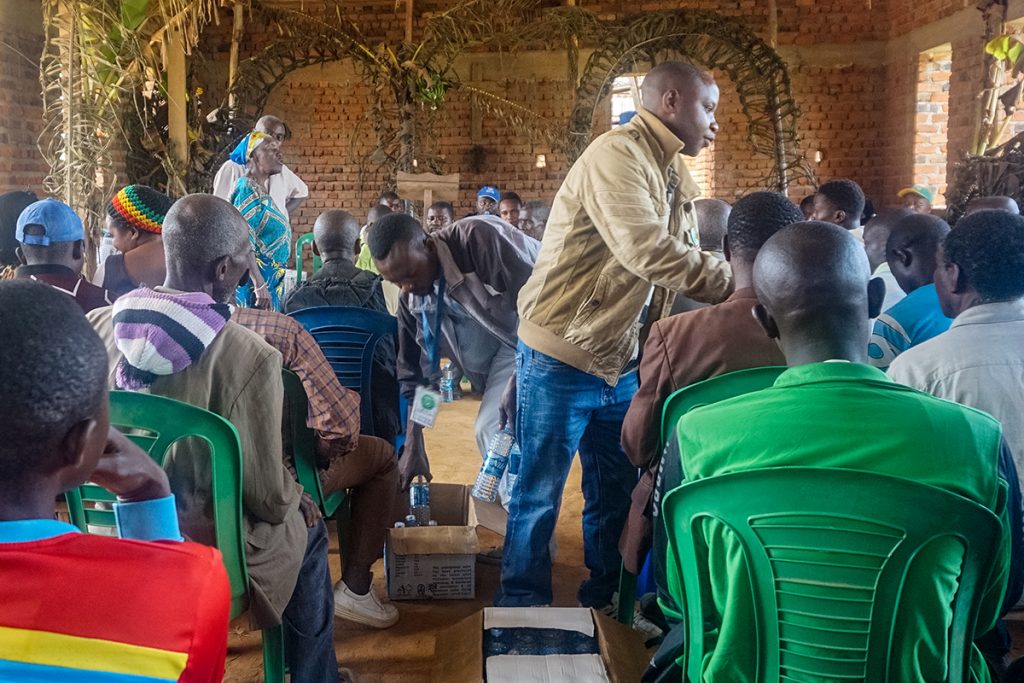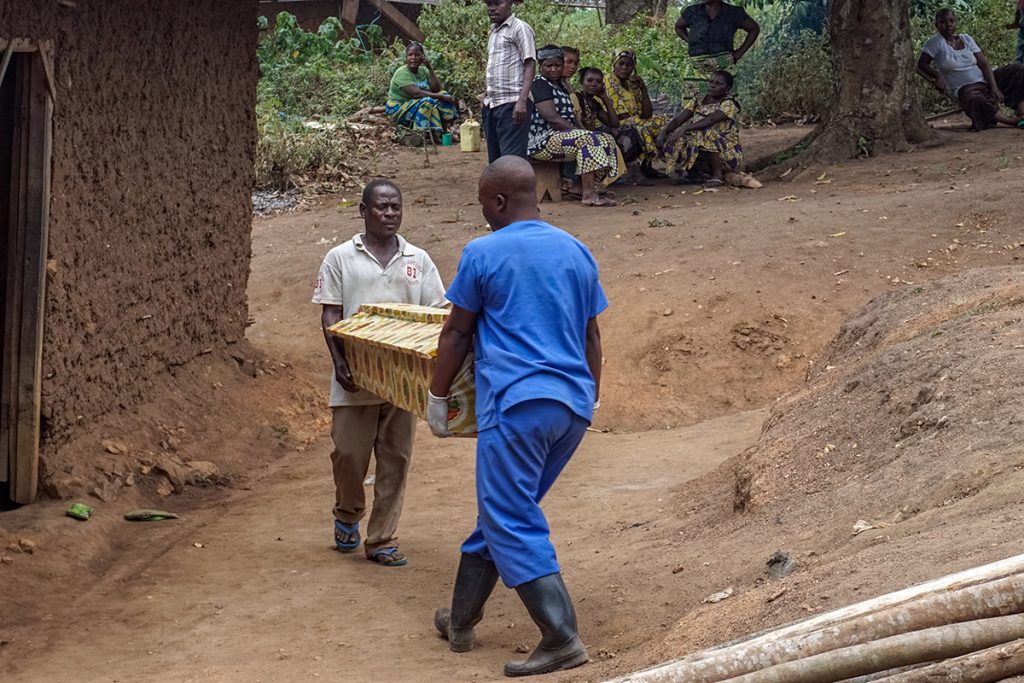KOMANDA, DEMOCRATIC REPUBLIC OF CONGO — Grief-stricken cries are clearly audible from the road here in this rural part of the country. There’s no mistaking that someone has lost a loved one.
A woman lies on the ground, crying. She’s overcome.
“Oh, my God, why me?” she cries. “Why, oh, why did my daughter die?”
Charlotte Masika’s 14-year-old child, Esperance, passed away on March 1.
The girl died from malaria, not Ebola. But Ebola’s presence in the area means that her body must be treated as though the virus caused her death. Only a trained response team is allowed to bury the dead here, according to DRC’s Ministry of Health guidelines, just in case the person’s cause of death was actually Ebola.
The response team, dressed in hooded coveralls, came to the family’s home. They wrapped Esperance’s body in a plastic bag and took it away.
“Looking at how they were carrying our kid’s dead body, we ended up finding ourselves at a loss for words,” says Jean-Pierre Kakule, Esperance’s father.
And instead of grieving at a graveside, Esperance’s family was left to weep on the side of a road.
“Her soul is not at peace,” Masika cries. “We haven’t been able to perform rituals, accompany her, and appease her spirit!”


Ebola is nothing new in DRC – the first outbreak recorded by health officials was in 1976. The virus was named for the country’s Ebola River, a tributary of the Congo River. There have been 10 outbreaks of Ebola in DRC in the last 40 years, including the one declared in August of 2018.
But the 2018 outbreak that began in the eastern part of the country has brought local people’s serious skepticism of outsiders to light, even if those outsiders are trying to save lives.
Some Congolese believe that aid agencies involved in Ebola treatment are exaggerating the risks of the virus so that they can line their own pockets with donor funds.
“I wonder why those people didn’t intervene and ride to the rescue of people who were being killed every day in Beni,” says Adeline Kahindo, a businesswoman who lives in Komanda, referring to an ongoing spate of violence between armed groups in the region. “Why did they wait until today to remember that we’re human beings? They should let us bury our dead.”


Many Congolese refrain from reporting when a family member shows symptoms of Ebola because they’re afraid that the family member will be taken away. If someone succumbs to the virus, the death is kept secret so that the family can carry out the burial rituals that they believe are key to appeasing their loved one’s spirit.
As of March 23, there have been 1009 recorded Ebola cases in DRC, including 629 deaths, according to the World Health Organization.
The outbreak is gaining ground because of serious tension between people who live here and health workers treating people who have the virus, says Gédéon Kamango, one among a group of young people recruited by the local Ebola response team to help spread awareness about the virus.
Kamango and the rest of his group go door to door and to churches, health centers and other meeting places to tell people about how to protect themselves from Ebola. He uses strong words to get people to take the virus seriously.
“It’s absolutely shameful for a man to refuse treatment,” Kamango says. “Only God alone can fix this situation and save us!”
Still, resistance to Ebola response teams, which are made up of health workers from multiple aid organizations, is fierce – and sometimes violent.




An Ebola treatment center run by Médecins Sans Frontières (known in English as Doctors Without Borders) in Butembo, a town to the south of Ituri Province, where Masika lives, was raided and set aflame in February.
Thirty-six people who were patients in the center fled and never returned, says Kambale Mupika, a Ministry of Health communications officer who assists an Ebola response team working in the Komanda area. Four of them were confirmed to have Ebola. The others had symptoms of Ebola but hadn’t been confirmed to have the virus.
There’s still no proof regarding who set fire to the clinic. Armed groups, some seeking to control land or terrorize communities, frequently move through the area, so one of them might be to blame, local people say. But there’s also a general consensus that it’s just as possible that someone from the community was angry enough to torch the clinic, out of rage at response teams for prohibiting people from carrying out important burial rituals.
That was one of at least two attacks on Ebola treatment centers in the area in February.


Many people don’t understand just how deadly the virus is, Mupika says.
Kasereka Mbayahi wants people to know that Ebola kills, but that it doesn’t have to.
Mbayahi contracted Ebola in late 2018. He went to a hospital as soon as his symptoms appeared. He was then referred to the Ebola response team and transported to an Ebola treatment center in Beni, 127 kilometers (79 miles) south of Komanda.
Mbayahi was successfully treated there.
“I’ve completely recovered,” he says.
Ndahayo Sylvestre, GPJ, translated the article from Swahili.







